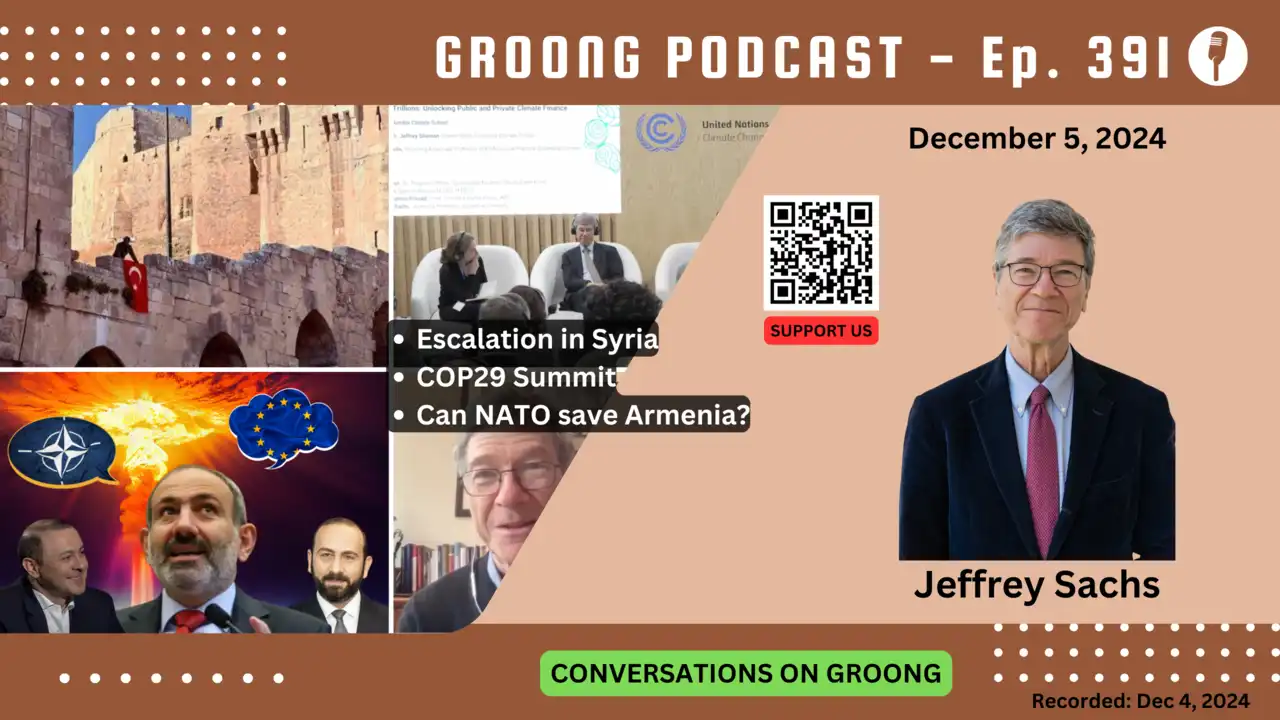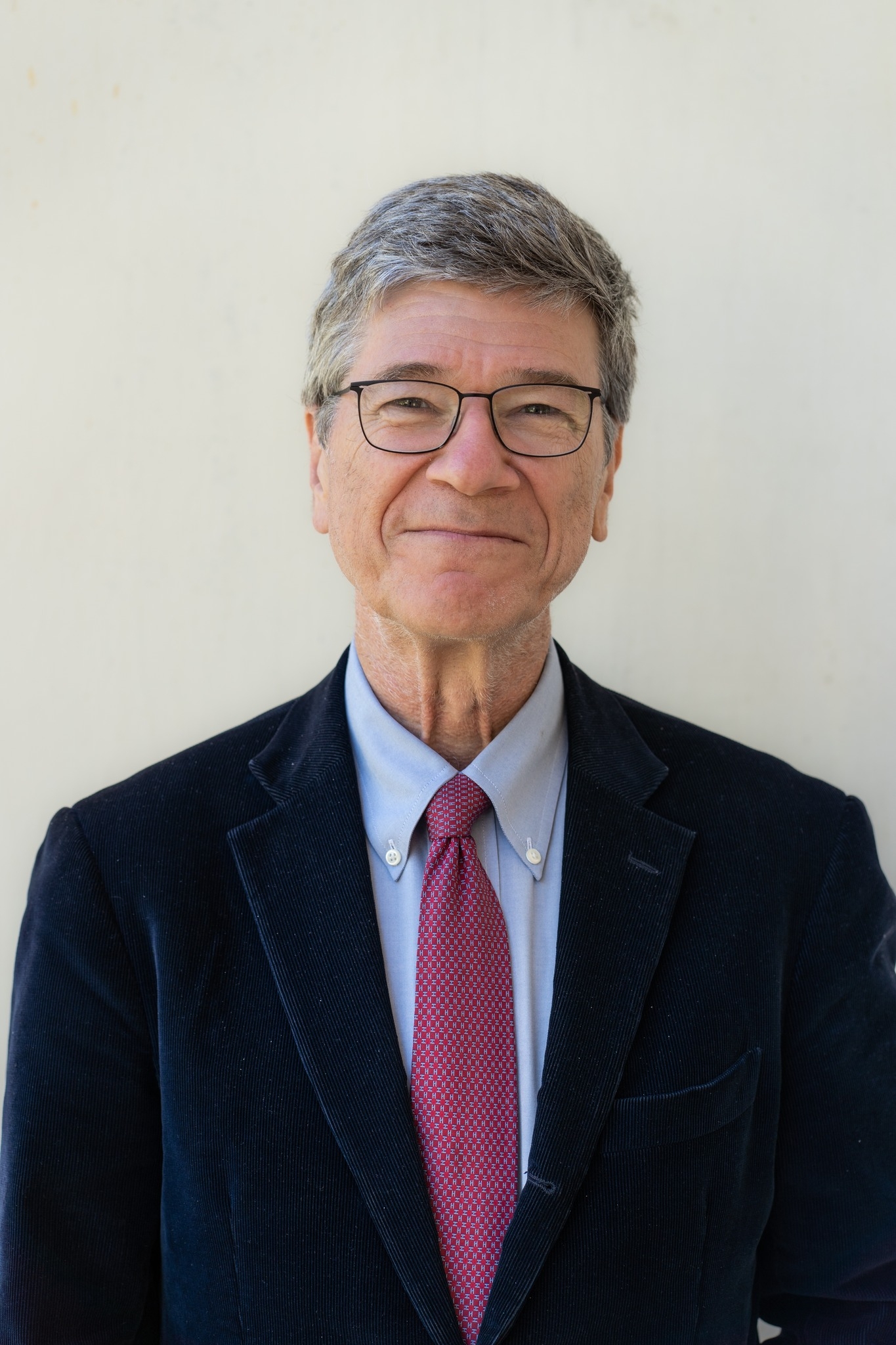
Groong Links:
Guest:
Topics:
- Escalation in Syria
- COP29 Summit
- Can NATO save Armenia?
Episode 391 | Recorded: December 4, 2024
Show Notes
Syria, COP29, Armenia
Professor Sachs, you were recently in Armenia and Azerbaijan and we’re eager to hear your experiences. We initially wanted to focus on your visit to Armenia, but world events compel us to take a short detour.
Escalation in Syria
Just as there seemed to be hope for a respite in Lebanon with a cease fire deal, which by the way is being violated daily by Israel, terrorist groups, some of whom enjoy the support, if not patronage, of Turkey, Israel and the US commenced an attack in Syria, taking control of the Aleppo and some surrounding towns and areas. Thus, a six year fragile peace that was agreed upon by Turkey, Iran, and Russia in Astana in 2017 was violated, increasing the instability in the region.
Questions:
- Is the timing of this attack, occurring immediately after the Lebanon ceasefire purely coincidental?
- What motivated Turkey, Israel and the US to open this new front? Specifically, what do you think motivated Erdogan to join this NATO plan, given his relations with Putin?
- How related do you think this escalation is to the general war in Ukraine?
It appears that the attack took Russia, Iran and even the Syrian government by surprise. Iranian proxy forces from Iraq are also being committed to help the Syrian regime in a counterattack, supported by the Russian air force. While it is clear that this attack couldn’t have happened without extensive support from the West and sponsorship by Turkey, the readout from a recent phone conversation between Putin and Erdogan stopped short of the Kremlin accusing Turkey and instead underscored the need for cooperation to “normalize” the situation. Iranian statements about the matter were also more or less diplomatic.
Question:
- Is this a signal that Russia and Iran are willing to accept this change in the status quo and potentially urge the Syrian government to negotiate and give concessions to Turkey?
- If so, does this continue a pattern of appeasement of dictators?
NOTES FROM THE DISCUSSION:
- Sachs highlighted the historical role of the US and Israel in destabilizing Syria.
- Turkey’s participation was influenced by Kurdish concerns and geopolitical aspirations.
- Russia, Iran, and Syria were caught off guard but seem reluctant to escalate tensions with Turkey.
COP29 and Beyond
In Azerbaijan
Professor Sachs, recently you traveled to Azerbaijan to attend COP29 in Baku. Your university, Columbia, was involved in a number of panels at the conference as well.
Also visiting COP29 were US congressmen including Frank Pallone and Ed Markey. Aliyev outright refused to meet with Congressman Pallone, who in fact had to cut his trip short due to the attacks on him.
Questions:
- How were your interactions with the Azerbaijani government, were there opportunities for you to discuss Armenian-Azerbaijani negotiations with any high-level officials?
- What were your overall impressions of your visit to Baku?
Azerbaijan is a dictatorship that suppresses free speech; jails or kills opposition members and journalists; ethnically cleansed Nagorno-Karabakh from its 150,000 indigenous Armenians just 15 months ago; it is a petro-state mega-polluter. Armenia withdrew its veto on holding COP29 in Baku, with the hopes that it would advance some goodwill and trust in the so-called peace negotiations with Azerbaijan, but that didn’t happen.
Despite token condemnations, world governments and organizations continue to engage with Baku, with European nations relying on Russian gas rerouted through Azeri pipelines and rebranded as “Azerbaijani Gas”.
Questions:
- How is it that the UN is willing to accept such a place as the venue for its COP conferences?
- Is the pattern of appeasing dictators a symptom of the breakdown of the international rule of law, during these times when we seem to be evolving into a new world order? Do we expect rogue behavior to die down in a more balanced, multipolar world?
NOTES FROM THE DISCUSSION:
- Sachs clarified his participation was unrelated to Azerbaijani politics, emphasizing the global nature of UN climate meetings and defended the UN’s approach to inclusivity.
- Armenia’s withdrawal of its veto for Baku hosting COP29 did not yield significant goodwill from Azerbaijan.
In Armenia
From Baku you went to Yerevan to talk to students at the AUA.
Questions:
- What was the purpose of your brief visit to Armenia?
- Besides giving public talks and hopefully doing some sightseeing, were you able to meet any Armenian officials?
Armenia is caught in the proxy war between the West and Russia, and both sides are pushing Armenia into compromises that undermine its national security, to the benefit of their sides. With Nagorno-Karabakh depopulated, the pro-western Armenian government is now interested in breaking out of its traditional alliance with Russia. It is also approaching relations with Iran very cautiously.
Given Armenia’s current geopolitical pivot, in your interviews in Armenian media, you cautioned against pinning hopes on the US.
Questions:
- Can you elaborate on your message? What would be a mutually beneficial US policy towards Armenia?
- How should Armenia navigate the current geopolitical environment?
NOTES FROM THE DISCUSSION:
- Sachs stressed the importance of regional diplomacy, warning against relying on the US for salvation.
- Suggested Armenia focus on pragmatic relationships with neighbors and resist unrealistic concessions in negotiations.
- Advocated for stronger regional cooperation through initiatives like BRICS and track-two diplomacy.
- Sachs critiqued the broader Western strategy of encircling Russia, referencing Zbigniew Brzezinski’s book The Grand Chessboard (1997).
- Brzezinski argued that controlling Eurasia was key to maintaining US global dominance and predicted that Russia would have no choice but to submit to Western influence. Sachs highlighted how this theory failed:
- Brzezinski underestimated Russia’s resilience and willingness to form alliances, particularly with China, to counteract Western encirclement.
- The assumption that Russia would quietly accept diminished influence in its traditional spheres of power was flawed, leading instead to increased tensions and confrontational geopolitics, as seen in Ukraine and the South Caucasus.
Previous interviews to Armenian media by Sachs:
- Arthur Khachikyan: https://www.youtube.com/live/xSrQkZGa_wU
- AUA: https://www.youtube.com/live/HMpzu6OVb9o
- 168: https://youtu.be/TvxjbpqguTs?si=unf1K42rZK9tzvVH
- Azatutyun: https://www.youtube.com/watch?v=W1UiRIyU_0o
- Armenian Public TV: https://www.youtube.com/watch?v=xgoBDo-0B-U
Wrap-up
That’s our show! We hope you found it useful. Please find us on Social Media and follow us everywhere you get your Armenian news.
Thanks to Laura Osborn for the music on our podcasts.
Guests

Jeffrey Sachs
Prof. Jeffrey Sachs is a world-renowned economics professor, bestselling author, innovative educator, and global leader in sustainable development.
Sachs is widely recognized for bold and effective strategies to address complex challenges including the escape from extreme poverty, the global battle against human-induced climate change, international debt and financial crises, national economic reforms, and the control of pandemic and epidemic diseases.
Sachs serves as the Director of the Center for Sustainable Development at Columbia University, where he holds the rank of University Professor, the university’s highest academic rank. Sachs was Director of the Earth Institute at Columbia University from 2002 to 2016. He is President of the UN Sustainable Development Solutions Network, Co-Chair of the Council of Engineers for the Energy Transition, academician of the Pontifical Academy of Social Sciences at the Vatican, Commissioner of the UN Broadband Commission for Development, Tan Sri Jeffrey Cheah Honorary Distinguished Professor at Sunway University, and SDG Advocate for UN Secretary General António Guterres. From 2001-18, Sachs served as Special Advisor to UN Secretaries-General Kofi Annan (2001-7), Ban Ki-moon (2008-16), and António Guterres (2017-18).
Sachs has authored and edited numerous books, including three New York Times bestsellers: The End of Poverty (2005), Common Wealth: Economics for a Crowded Planet (2008), and The Price of Civilization (2011). Other books include To Move the World: JFK’s Quest for Peace (2013), The Age of Sustainable Development (2015), Building the New American Economy: Smart, Fair & Sustainable (2017), A New Foreign Policy: Beyond American Exceptionalism (2018), The Ages of Globalization: Geography, Technology, and Institutions (2020), and most recently, Ethics in Action for Sustainable Development (2022).
Sachs is the 2022 recipient of the Tang Prize in Sustainable Development and was the co-recipient of the 2015 Blue Planet Prize, the leading global prize for environmental leadership. He was twice named among Time magazine’s 100 most influential world leaders. Sachs has received 42 honorary doctorates, and his recent awards include the 2022 Tang Prize in Sustainable Development, the Legion of Honor by decree of the President of the Republic of France, and the Order of the Cross from the President of Estonia.
Prior to joining Columbia, Sachs spent over twenty years as a professor at Harvard University, most recently as the Galen L. Stone Professor of International Trade. A native of Detroit, Michigan, Sachs received his B.A., M.A., and Ph.D. degrees at Harvard.
Hosts

Asbed Bedrossian
Asbed Bedrossian is an IT professional, and for years oversaw the central IT enterprise infrastructure and services at USC. His decades of experience spanned across IT strategy, enterprise architecture, infrastructure, cybersecurity, enterprise applications, data center operations, high performance computing, ITSM, ITPM, and more.
Asbed founded the Armenian News Network Groong circa 1989/1990, and co-founded the ANN/Groong podcast in 2020.

Hovik Manucharyan
Hovik Manucharyan is an information security engineer who moved from Seattle to Armenia in 2022. He co-founded the ANN/Groong podcast in 2020 and has been a contributor to Groong News since the late 1990s.
Disclaimer: The views expressed by Hovik Manucharyan on the ANN/Groong podcast are his own and do not necessarily reflect the opinions of his employer or any other organization.